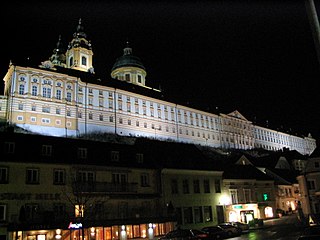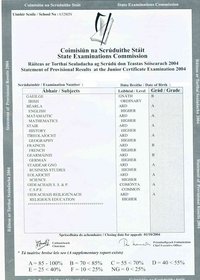
A student is primarily a person enrolled in a school or other educational institution who attends classes in a course to attain the appropriate level of mastery of a subject under the guidance of an instructor and who devotes time outside class to do whatever activities the instructor assigns that are necessary either for class preparation or to submit evidence of progress towards that mastery. In the broader sense, a student is anyone who applies themselves to the intensive intellectual engagement with some matter necessary to master it as part of some practical affair in which such mastery is basic or decisive.
The Leaving Certificate Examination, which is commonly referred to as the Leaving Cert, is the university matriculation examination in the Republic of Ireland and the final exam of the Irish secondary school system. It takes a minimum of two years preparation, but an optional Transition Year means that for those students it takes place three years after the Junior Certificate Examination. These years are referred to collectively as "The Senior Cycle." Most students taking the examination are aged 16–20; in excess of eighty percent of this group undertake the exam. The Examination is overseen by the State Examinations Commission. The Leaving Certificate Examinations are taken annually by approximately 55,000 students.

A gymnasium is a type of school with a strong emphasis on academic learning, and providing advanced secondary education in some parts of Europe comparable to British grammar schools, sixth form colleges and US preparatory high schools. In its current meaning, it usually refers to secondary schools focused on preparing students to enter a university for advanced academic study. Before the 20th century, the system of gymnasiums was a widespread feature of educational system throughout many countries of central, north, eastern, and south Europe.

Matura or its translated terms is a Latin name for the secondary school exit exam or "maturity diploma" in various countries, including Albania, Austria, Bosnia and Herzegovina, Bulgaria, Croatia, the Czech Republic, Hungary, Italy, Kosovo, Liechtenstein, Macedonia, Montenegro, Poland, Serbia, Slovakia, Slovenia, Switzerland and Ukraine.

The baccalauréat, often known in France colloquially as bac, is an academic qualification that French students are required to take to graduate high school. Introduced by Napoleon I in 1808, it is the main diploma that is required to pursue university studies.

Education in Sweden is mandatory for children between ages 6 and 15. The school year in Sweden runs from mid/late August to early/mid June. The Christmas holiday from mid December to early January divides the Swedish school year into two terms.

A graduate school is a school that awards advanced academic degrees with the general requirement that students must have earned a previous undergraduate (bachelor's) degree with a high grade point average. A distinction is typically made between graduate schools and professional schools, which offer specialized advanced degrees in professional fields such as medicine, nursing, business, engineering, speech-language pathology, or law. The distinction between graduate schools and professional schools is not absolute, as various professional schools offer graduate degrees and vice versa.

The responsibility for the education system in Germany lies primarily with the states (Länder), while the federal government plays a minor role. Optional Kindergarten education is provided for all children between one and six years old, after which school attendance is compulsory. The system varies throughout Germany because each state (Land) decides its own educational policies. Most children, however, first attend Grundschule from the age of six to eleven.
A Master of Laws is a postgraduate academic degree, pursued by those either holding an undergraduate academic law degree, a professional law degree, or an undergraduate degree in a related subject. In some jurisdictions the "Master of Laws" is the basic professional degree for admission into legal practice.

The Junior Certificate or "Junior Cert" for short, is an educational qualification awarded in Ireland by the Department of Education and Skills to students who have successfully completed the junior cycle of secondary education and achieved a minimum standard in their Junior Certificate Examination. These exams, like those for the Leaving Certificate, are supervised by the State Examinations Commission. A "recognised pupil" who commences the Junior Cycle must reach at least 12 years of age on 1 January of the school year of admission and must have completed primary education; the examination is normally taken after three years' study in a secondary school. Typically a student takes 9 to 13 subjects – including English, Irish and Mathematics – as part of the Junior Cycle. The examination does not reach the standards for college or university entrance; instead, a school leaver in Ireland will typically take the Leaving Certificate Examination two or three years after completion of the Junior Certificate to reach that standard.
The Higher Preparatory Examination is a 2-year general upper secondary programme building on to the 10th form of the Folkeskole and leading to the higher preparatory examination, which qualifies for admission to higher education, subject to the special entrance regulations applying to the individual higher education programmes.
Tenth grade, sophomore year, or grade 10 is the tenth year of school post-kindergarten or the tenth year after the first introductory year upon entering compulsory schooling. In many parts of the world, the students are 15–16 years of age, depending on when their birthday occurs. The variants of 10th grade in various nations are described below.
University admission or college admission is the process through which students enter tertiary education at universities and colleges. Systems vary widely from country to country, and sometimes from institution to institution.

Located in Worcester, Massachusetts, the Massachusetts Academy of Math and Science at WPI was founded in 1992 by the Massachusetts State Legislature as a public, non-residential magnet school to serve academically advanced youth in grades eleven and twelve in math, science, and technology.

Education in Portugal is free and compulsory until the age of 18, when students complete the 12th grade. The education is regulated by the State through the Ministry of Education. There is a system of public education and also many private schools at all levels of education. The first Portuguese medieval universities, such as the University of Coimbra, were created in the 13th century, and the national higher education system is fully integrated into the European Higher Education Area.

A Hauptschule is a secondary school in Germany, starting after four years of elementary schooling, which offers Lower Secondary Education according to the International Standard Classification of Education. Any student who attends a German elementary school can go to a Hauptschule or Gesamtschule, while students who want to attend a Realschule or Gymnasium need to have good marks in order to do so. The students spend five to six years at the Hauptschule, from 5th to 9th grade. They finish around age 15 to 17.

Realschule is a type of secondary school in Germany, Switzerland and Liechtenstein. It has also existed in Croatia, Austrian Empire, German Empire, Denmark and Norway (realskole), Sweden (realskola), Hungary (reáliskola), Slovenia (realka) and in the Russian Empire.

Gymnasium, in the German education system, is the most advanced of the three types of German secondary schools, the others being Realschule and Hauptschule. Gymnasium strongly emphasizes academic learning, comparable to the British grammar school system or with prep schools in the United States. A student attending Gymnasium is called a Gymnasiast. In 2009/10 there were 3,094 gymnasia in Germany, with c. 2,475,000 students, resulting in an average student number of 800 students per school.
The Ministry of Education Language Centre is a centralised educational institution for students in Singapore's education system to learn additional languages. There are two campuses located in Bishan and Newton, which are managed by the Ministry of Education of Singapore. Students attend the institution on top of the existing school they are attending.














